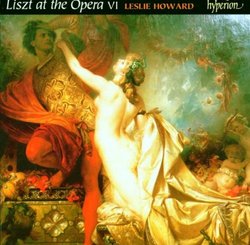| All Artists: Franz Liszt, Leslie Howard Title: Liszt at the Opera: Operatic Fantasies, Paraphrases, and Transcriptions, Vol. VI (Complete Music for Solo Piano, Vol. 54) Members Wishing: 1 Total Copies: 0 Label: Hyperion UK Release Date: 3/9/1999 Album Type: Import Genres: Special Interest, Classical Styles: Marches, Opera & Classical Vocal, Chamber Music, Historical Periods, Classical (c.1770-1830) Number of Discs: 2 SwapaCD Credits: 2 UPC: 034571174068 |
Search - Franz Liszt, Leslie Howard :: Liszt at the Opera: Operatic Fantasies, Paraphrases, and Transcriptions, Vol. VI (Complete Music for Solo Piano, Vol. 54)
 | Franz Liszt, Leslie Howard Liszt at the Opera: Operatic Fantasies, Paraphrases, and Transcriptions, Vol. VI (Complete Music for Solo Piano, Vol. 54) Genres: Special Interest, Classical
|
Larger Image |
CD Details |
CD ReviewsLiszt the Impresario - Part 6 Hexameron | 08/23/2006 (5 out of 5 stars) "This sixth and final volume of the "Liszt at the Opera" series is much like the previous volume in that it will appeal primarily to Liszt connoisseurs. Most of the works on this 2-CD volume are alternate versions of fantasies already introduced in previous volumes. Some of these versions are distinctly different while others sound like copies. However, all of these operatic transcriptions/fantasies, especially the newcomers to the series, are ambrosia to the Lisztian or Romantic piano lover. Howard has reached the bottom of the barrel as far as uncovering more operatic transcriptions or paraphrases. Not surprisingly, he has seen fit to record more drafts and revisions. The "first version" of the "La fiancee" fantasy is acutely different from the final version with an extra four minutes of extended phrases and embellishments. I actually prefer this first version of a work which is essentially Liszt's first operatic fantasy (it dates from 1829). Liszt's Reminiscences of Meyerbeer's "Les Huguenots" makes its third appearance, this time as the "second version" which may tack a good seven minutes of material onto the first version, but is barely distinguishable from the "third" and final version (different coda). Howard also records more alternate versions of the "La sonnambula" fantasy, the Reminiscences of Bellini's "Il Puritani" and the "Valse a cappriccio." These will not offer much startling contrasts or new music material to those familiar with the music. In my opinion, only the astute Liszt aficionado will detect significant differences between these versions or find reasons to enjoy them over other versions previously recorded. This recording earns a solid five stars, though, for the new works Howard unearths. The Ernani "Premiere paraphrase de concert" is wholly original and quite different from the Ernani paraphrase found on Vol. 1. In the "Premiere paraphrase," new thematic material from the opera is introduced and more variations ensue. While I prefer the darker mood of the first paraphrase on Vol. 1, this "Premiere paraphrase" is undeniably haunting and beautiful. Liszt's mighty transcription of the colossal "Tannhäuser" overture was once a warhorse with plenty of champions (Moiseiwitsch and Bolet come to mind). But I believe Howard gives the most perfect delivery I've ever heard with robust grandeur and clear articulation. On a concentrated listening I could not hear a single mistake or signs of fatigue, especially in the final taxing explosions of chromatic octaves. Liszt himself said he preferred to abstain from playing this piece in his old age due to the physical demands. This makes Howard's flawless execution even more amazing. Liszt's Fantasy on Themes from Weber's "Der Freischütz" is new to the series and should not be confused with the transcription of the overture found on Vol. 1. In this large-scale 15-minute fantasy, Liszt stitches together reflective and impassioned elaborations on Weber's inherently attractive themes. The most pleasing and genuinely new opera fantasy to appear on this volume is the "Reminiscences of La Scala" based on Giuseppe Mercadante's "Il giuramento." Liszt creates some gorgeous melodic strains and evokes warmth and passion. Indeed, the music recalls the emotional and sentimental power of Liszt's own Liebestraumen and Consolations. This 16-minute fantasy of fresh, seductive, and attractive ideas makes me wonder about Mercadante's obscurity. Bottom line: Howard and Hyperion have produced a spellbinding, immaculate and much-appreciated "Liszt at the Opera" series. Before Howard/Hyperion, few listeners knew about some of these unjustly neglected pieces from Liszt's output. Now an abundance of rare Liszt fantasies are available and this final volume makes a grand conclusion to a milestone of a series." Some of Liszt's best opera transcriptions here Hexameron | 07/11/2001 (5 out of 5 stars) "Volume VI concentrates on longer pieces: Reminiscences des Huguenots (Meyerbeer), Fantaisie on La sonnambula (Bellini), Tannhauser overture (Wagner), etc. Solid final entry in the "Liszt at the Opera" series. Highly recommended."
|

 Track Listings (5) - Disc #1
Track Listings (5) - Disc #1